#Ecosystem of Hadoop
Explore tagged Tumblr posts
Text
As a dev, can confirm.
I've used multiple dev- or sysadmin-oriented software without understanding what they were for, but they were needed by some other parts of the system.

#still not sure what zookeeper does#it's supposedly a vital part of the hadoop ecosystem#we used it for kafka#other things i took a while to get:#mongodb#noSQL#document-based DBs#map-reduce#and so much networking stuff
24K notes
·
View notes
Text
SQL for Hadoop: Mastering Hive and SparkSQL
In the ever-evolving world of big data, having the ability to efficiently query and analyze data is crucial. SQL, or Structured Query Language, has been the backbone of data manipulation for decades. But how does SQL adapt to the massive datasets found in Hadoop environments? Enter Hive and SparkSQL—two powerful tools that bring SQL capabilities to Hadoop. In this blog, we'll explore how you can master these query languages to unlock the full potential of your data.
Hive Architecture and Data Warehouse Concept
Apache Hive is a data warehouse software built on top of Hadoop. It provides an SQL-like interface to query and manage large datasets residing in distributed storage. Hive's architecture is designed to facilitate the reading, writing, and managing of large datasets with ease. It consists of three main components: the Hive Metastore, which stores metadata about tables and schemas; the Hive Driver, which compiles, optimizes, and executes queries; and the Hive Query Engine, which processes the execution of queries.
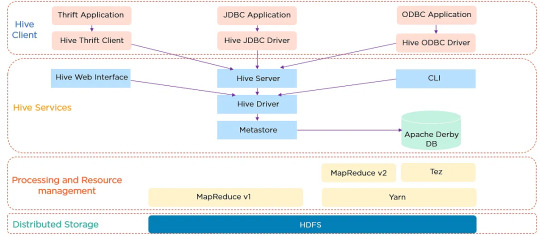
Hive Architecture
Hive's data warehouse concept revolves around the idea of abstracting the complexity of distributed storage and processing, allowing users to focus on the data itself. This abstraction makes it easier for users to write queries without needing to know the intricacies of Hadoop.
Writing HiveQL Queries
HiveQL, or Hive Query Language, is a SQL-like query language that allows users to query data stored in Hadoop. While similar to SQL, HiveQL is specifically designed to handle the complexities of big data. Here are some basic HiveQL queries to get you started:
Creating a Table:
CREATE TABLE employees ( id INT, name STRING, salary FLOAT );
Loading Data:
LOAD DATA INPATH '/user/hive/data/employees.csv' INTO TABLE employees;
Querying Data:
SELECT name, salary FROM employees WHERE salary > 50000;
HiveQL supports a wide range of functions and features, including joins, group by, and aggregations, making it a versatile tool for data analysis.
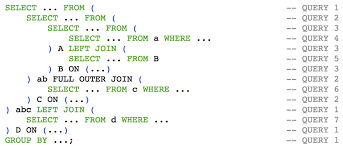
HiveQL Queries
SparkSQL vs HiveQL: Similarities & Differences
Both SparkSQL and HiveQL offer SQL-like querying capabilities, but they have distinct differences:
Execution Engine: HiveQL relies on Hadoop's MapReduce engine, which can be slower due to its batch processing nature. SparkSQL, on the other hand, leverages Apache Spark's in-memory computing, resulting in faster query execution.
Ease of Use: HiveQL is easier for those familiar with traditional SQL syntax, while SparkSQL requires understanding Spark's APIs and dataframes.
Integration: SparkSQL integrates well with Spark's ecosystem, allowing for seamless data processing and machine learning tasks. HiveQL is more focused on data warehousing and batch processing.
Despite these differences, both languages provide powerful tools for interacting with big data, and knowing when to use each is key to mastering them.
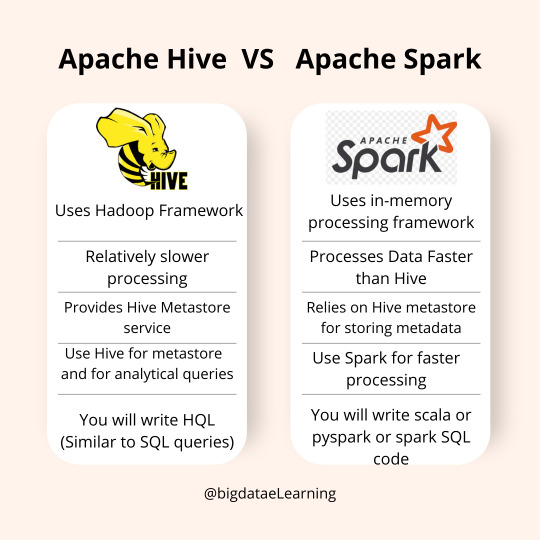
SparkSQL vs HiveQL
Running SQL Queries on Massive Distributed Data
Running SQL queries on massive datasets requires careful consideration of performance and efficiency. Hive and SparkSQL both offer powerful mechanisms to optimize query execution, such as partitioning and bucketing.
Partitioning, Bucketing, and Performance Tuning
Partitioning and bucketing are techniques used to optimize query performance in Hive and SparkSQL:
Partitioning: Divides data into distinct subsets, allowing queries to skip irrelevant partitions and reduce the amount of data scanned. For example, partitioning by date can significantly speed up queries that filter by specific time ranges.
Bucketing: Further subdivides data within partitions into buckets based on a hash function. This can improve join performance by aligning data in a way that allows for more efficient processing.
Performance tuning in Hive and SparkSQL involves understanding and leveraging these techniques, along with optimizing query logic and resource allocation.

Hive and SparkSQL Partitioning & Bucketing
FAQ
1. What is the primary use of Hive in a Hadoop environment? Hive is primarily used as a data warehousing solution, enabling users to query and manage large datasets with an SQL-like interface.
2. Can HiveQL and SparkSQL be used interchangeably? While both offer SQL-like querying capabilities, they have different execution engines and integration capabilities. HiveQL is suited for batch processing, while SparkSQL excels in in-memory data processing.
3. How do partitioning and bucketing improve query performance? Partitioning reduces the data scanned by dividing it into subsets, while bucketing organizes data within partitions, optimizing joins and aggregations.
4. Is it necessary to know Java or Scala to use SparkSQL? No, SparkSQL can be used with Python, R, and SQL, though understanding Spark's APIs in Java or Scala can provide additional flexibility.
5. How does SparkSQL achieve faster query execution compared to HiveQL? SparkSQL utilizes Apache Spark's in-memory computation, reducing the latency associated with disk I/O and providing faster query execution times.
Home
instagram
#Hive#SparkSQL#DistributedComputing#BigDataProcessing#SQLOnBigData#ApacheSpark#HadoopEcosystem#DataAnalytics#SunshineDigitalServices#TechForAnalysts#Instagram
2 notes
·
View notes
Text
🚀 Exploring Kafka: Scenario-Based Questions 📊
Dear community, As Kafka continues to shape modern data architectures, it's crucial for professionals to delve into scenario-based questions to deepen their understanding and application. Whether you're a seasoned Kafka developer or just starting out, here are some key scenarios to ponder: 1️⃣ **Scaling Challenges**: How would you design a Kafka cluster to handle a sudden surge in incoming data without compromising latency? 2️⃣ **Fault Tolerance**: Describe the steps you would take to ensure high availability in a Kafka setup, considering both hardware and software failures. 3️⃣ **Performance Tuning**: What metrics would you monitor to optimize Kafka producer and consumer performance in a high-throughput environment? 4️⃣ **Security Measures**: How do you secure Kafka clusters against unauthorized access and data breaches? What are some best practices? 5️⃣ **Integration with Ecosystem**: Discuss a real-world scenario where Kafka is integrated with other technologies like Spark, Hadoop, or Elasticsearch. What challenges did you face and how did you overcome them? Follow : https://algo2ace.com/kafka-stream-scenario-based-interview-questions/
#Kafka #BigData #DataEngineering #TechQuestions #ApacheKafka #BigData #Interview
2 notes
·
View notes
Text
Essential Skills for Aspiring Data Scientists in 2024

Welcome to another edition of Tech Insights! Today, we're diving into the essential skills that aspiring data scientists need to master in 2024. As the field of data science continues to evolve, staying updated with the latest skills and tools is crucial for success. Here are the key areas to focus on:
1. Programming Proficiency
Proficiency in programming languages like Python and R is foundational. Python, in particular, is widely used for data manipulation, analysis, and building machine learning models thanks to its rich ecosystem of libraries such as Pandas, NumPy, and Scikit-learn.
2. Statistical Analysis
A strong understanding of statistics is essential for data analysis and interpretation. Key concepts include probability distributions, hypothesis testing, and regression analysis, which help in making informed decisions based on data.
3. Machine Learning Mastery
Knowledge of machine learning algorithms and frameworks like TensorFlow, Keras, and PyTorch is critical. Understanding supervised and unsupervised learning, neural networks, and deep learning will set you apart in the field.
4. Data Wrangling Skills
The ability to clean, process, and transform data is crucial. Skills in using libraries like Pandas and tools like SQL for database management are highly valuable for preparing data for analysis.
5. Data Visualization
Effective communication of your findings through data visualization is important. Tools like Tableau, Power BI, and libraries like Matplotlib and Seaborn in Python can help you create impactful visualizations.
6. Big Data Technologies
Familiarity with big data tools like Hadoop, Spark, and NoSQL databases is beneficial, especially for handling large datasets. These tools help in processing and analyzing big data efficiently.
7. Domain Knowledge
Understanding the specific domain you are working in (e.g., finance, healthcare, e-commerce) can significantly enhance your analytical insights and make your solutions more relevant and impactful.
8. Soft Skills
Strong communication skills, problem-solving abilities, and teamwork are essential for collaborating with stakeholders and effectively conveying your findings.
Final Thoughts
The field of data science is ever-changing, and staying ahead requires continuous learning and adaptation. By focusing on these key skills, you'll be well-equipped to navigate the challenges and opportunities that 2024 brings.
If you're looking for more in-depth resources, tips, and articles on data science and machine learning, be sure to follow Tech Insights for regular updates. Let's continue to explore the fascinating world of technology together!
#artificial intelligence#programming#coding#python#success#economy#career#education#employment#opportunity#working#jobs
2 notes
·
View notes
Text
Java's Lasting Impact: A Deep Dive into Its Wide Range of Applications
Java programming stands as a towering pillar in the world of software development, known for its versatility, robustness, and extensive range of applications. Since its inception, Java has played a pivotal role in shaping the technology landscape. In this comprehensive guide, we will delve into the multifaceted world of Java programming, examining its wide-ranging applications, discussing its significance, and highlighting how ACTE Technologies can be your guiding light in mastering this dynamic language.

The Versatility of Java Programming:
Java programming is synonymous with adaptability. It's a language that transcends boundaries and finds applications across diverse domains. Here are some of the key areas where Java's versatility shines:
1. Web Development: Java has long been a favorite choice for web developers. Robust and scalable, it powers dynamic web applications, allowing developers to create interactive and feature-rich websites. Java-based web frameworks like Spring and JavaServer Faces (JSF) simplify the development of complex web applications.
2. Mobile App Development: The most widely used mobile operating system in the world, Android, mainly relies on Java for app development. Java's "write once, run anywhere" capability makes it an ideal choice for creating Android applications that run seamlessly on a wide range of devices.
3. Desktop Applications: Java's Swing and JavaFX libraries enable developers to craft cross-platform desktop applications with sophisticated graphical user interfaces (GUIs). This cross-platform compatibility ensures that your applications work on Windows, macOS, and Linux.
4. Enterprise Software: Java's strengths in scalability, security, and performance make it a preferred choice for developing enterprise-level applications. Customer Relationship Management (CRM) systems, Enterprise Resource Planning (ERP) software, and supply chain management solutions often rely on Java to deliver reliability and efficiency.
5. Game Development: Java isn't limited to business applications; it's also a contender in the world of gaming. Game developers use Java, along with libraries like LibGDX, to create both 2D and 3D games. The language's versatility allows game developers to target various platforms.
6. Big Data and Analytics: Java plays a significant role in the big data ecosystem. Popular frameworks like Apache Hadoop and Apache Spark utilize Java for processing and analyzing massive datasets. Its performance capabilities make it a natural fit for data-intensive tasks.
7. Internet of Things (IoT): Java's ability to run on embedded devices positions it well for IoT development. It is used to build applications for smart homes, wearable devices, and industrial automation systems, connecting the physical world to the digital realm.
8. Scientific and Research Applications: In scientific computing and research projects, Java's performance and libraries for data analysis make it a valuable tool. Researchers leverage Java to process and analyze data, simulate complex systems, and conduct experiments.
9. Cloud Computing: Java is a popular choice for building cloud-native applications and microservices. It is compatible with cloud platforms such as AWS, Azure, and Google Cloud, making it integral to cloud computing's growth.

Why Java Programming Matters:
Java programming's enduring significance in the tech industry can be attributed to several compelling reasons:
Platform Independence: Java's "write once, run anywhere" philosophy allows code to be executed on different platforms without modification. This portability enhances its versatility and cost-effectiveness.
Strong Ecosystem: Java boasts a rich ecosystem of libraries, frameworks, and tools that expedite development and provide solutions to a wide range of challenges. Developers can leverage these resources to streamline their projects.
Security: Java places a strong emphasis on security. Features like sandboxing and automatic memory management enhance the language's security profile, making it a reliable choice for building secure applications.
Community Support: Java enjoys the support of a vibrant and dedicated community of developers. This community actively contributes to its growth, ensuring that Java remains relevant, up-to-date, and in line with industry trends.
Job Opportunities: Proficiency in Java programming opens doors to a myriad of job opportunities in software development. It's a skill that is in high demand, making it a valuable asset in the tech job market.
Java programming is a dynamic and versatile language that finds applications in web and mobile development, enterprise software, IoT, big data, cloud computing, and much more. Its enduring relevance and the multitude of opportunities it offers in the tech industry make it a valuable asset in a developer's toolkit.
As you embark on your journey to master Java programming, consider ACTE Technologies as your trusted partner. Their comprehensive training programs, expert guidance, and hands-on experiences will equip you with the skills and knowledge needed to excel in the world of Java development.
Unlock the full potential of Java programming and propel your career to new heights with ACTE Technologies. Whether you're a novice or an experienced developer, there's always more to discover in the world of Java. Start your training journey today and be at the forefront of innovation and technology with Java programming.
8 notes
·
View notes
Text
Your Journey Through the AWS Universe: From Amateur to Expert
In the ever-evolving digital landscape, cloud computing has emerged as a transformative force, reshaping the way businesses and individuals harness technology. At the forefront of this revolution stands Amazon Web Services (AWS), a comprehensive cloud platform offered by Amazon. AWS is a dynamic ecosystem that provides an extensive range of services, designed to meet the diverse needs of today's fast-paced world.
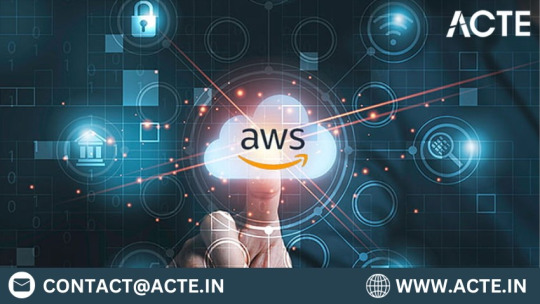
This guide is your key to unlocking the boundless potential of AWS. We'll embark on a journey through the AWS universe, exploring its multifaceted applications and gaining insights into why it has become an indispensable tool for organizations worldwide. Whether you're a seasoned IT professional or a newcomer to cloud computing, this comprehensive resource will illuminate the path to mastering AWS and leveraging its capabilities for innovation and growth. Join us as we clarify AWS and discover how it is reshaping the way we work, innovate, and succeed in the digital age.
Navigating the AWS Universe:
Hosting Websites and Web Applications: AWS provides a secure and scalable place for hosting websites and web applications. Services like Amazon EC2 and Amazon S3 empower businesses to deploy and manage their online presence with unwavering reliability and high performance.
Scalability: At the core of AWS lies its remarkable scalability. Organizations can seamlessly adjust their infrastructure according to the ebb and flow of workloads, ensuring optimal resource utilization in today's ever-changing business environment.
Data Storage and Backup: AWS offers a suite of robust data storage solutions, including the highly acclaimed Amazon S3 and Amazon EBS. These services cater to the diverse spectrum of data types, guaranteeing data security and perpetual availability.
Databases: AWS presents a panoply of database services such as Amazon RDS, DynamoDB, and Redshift, each tailored to meet specific data management requirements. Whether it's a relational database, a NoSQL database, or data warehousing, AWS offers a solution.
Content Delivery and CDN: Amazon CloudFront, AWS's content delivery network (CDN) service, ushers in global content distribution with minimal latency and blazing data transfer speeds. This ensures an impeccable user experience, irrespective of geographical location.
Machine Learning and AI: AWS boasts a rich repertoire of machine learning and AI services. Amazon SageMaker simplifies the development and deployment of machine learning models, while pre-built AI services cater to natural language processing, image analysis, and more.
Analytics: In the heart of AWS's offerings lies a robust analytics and business intelligence framework. Services like Amazon EMR enable the processing of vast datasets using popular frameworks like Hadoop and Spark, paving the way for data-driven decision-making.
IoT (Internet of Things): AWS IoT services provide the infrastructure for the seamless management and data processing of IoT devices, unlocking possibilities across industries.
Security and Identity: With an unwavering commitment to data security, AWS offers robust security features and identity management through AWS Identity and Access Management (IAM). Users wield precise control over access rights, ensuring data integrity.
DevOps and CI/CD: AWS simplifies DevOps practices with services like AWS CodePipeline and AWS CodeDeploy, automating software deployment pipelines and enhancing collaboration among development and operations teams.
Content Creation and Streaming: AWS Elemental Media Services facilitate the creation, packaging, and efficient global delivery of video content, empowering content creators to reach a global audience seamlessly.
Migration and Hybrid Cloud: For organizations seeking to migrate to the cloud or establish hybrid cloud environments, AWS provides a suite of tools and services to streamline the process, ensuring a smooth transition.
Cost Optimization: AWS's commitment to cost management and optimization is evident through tools like AWS Cost Explorer and AWS Trusted Advisor, which empower users to monitor and control their cloud spending effectively.
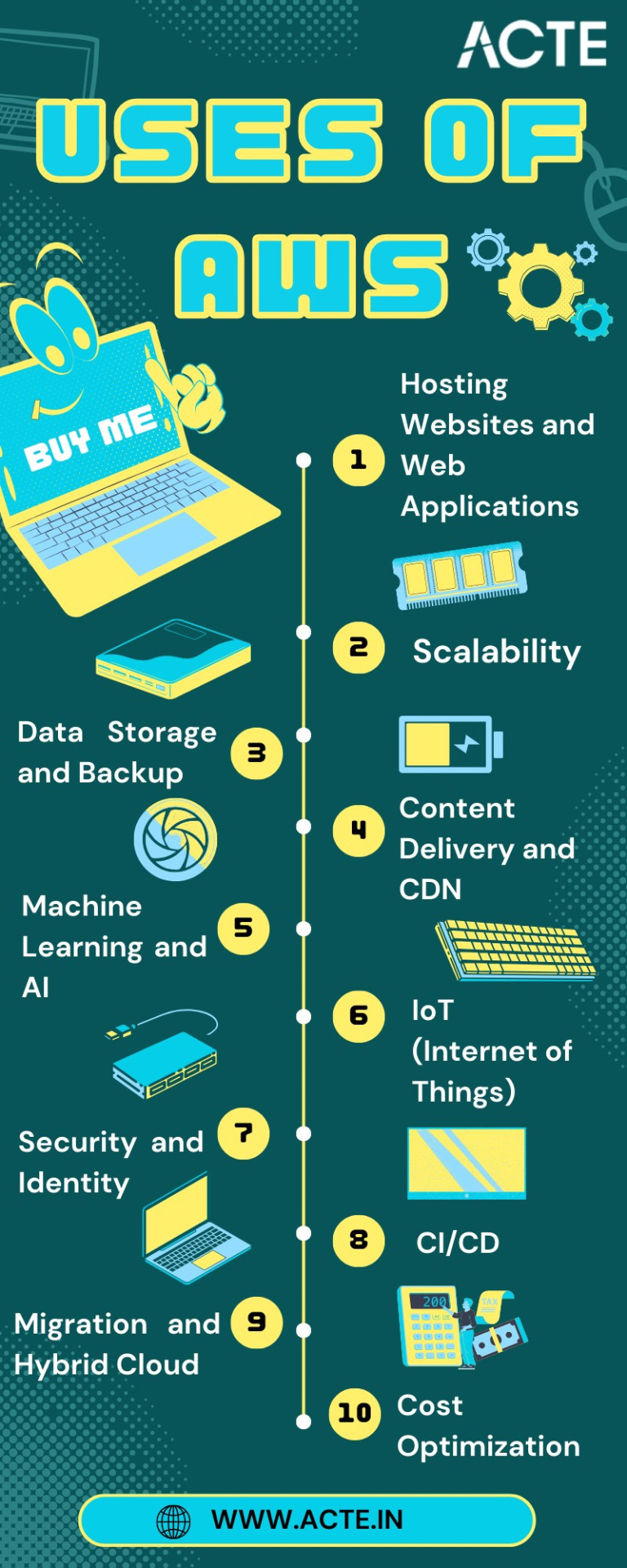
In this comprehensive journey through the expansive landscape of Amazon Web Services (AWS), we've embarked on a quest to unlock the power and potential of cloud computing. AWS, standing as a colossus in the realm of cloud platforms, has emerged as a transformative force that transcends traditional boundaries.
As we bring this odyssey to a close, one thing is abundantly clear: AWS is not merely a collection of services and technologies; it's a catalyst for innovation, a cornerstone of scalability, and a conduit for efficiency. It has revolutionized the way businesses operate, empowering them to scale dynamically, innovate relentlessly, and navigate the complexities of the digital era.
In a world where data reigns supreme and agility is a competitive advantage, AWS has become the bedrock upon which countless industries build their success stories. Its versatility, reliability, and ever-expanding suite of services continue to shape the future of technology and business.
Yet, AWS is not a solitary journey; it's a collaborative endeavor. Institutions like ACTE Technologies play an instrumental role in empowering individuals to master the AWS course. Through comprehensive training and education, learners are not merely equipped with knowledge; they are forged into skilled professionals ready to navigate the AWS universe with confidence.
As we contemplate the future, one thing is certain: AWS is not just a destination; it's an ongoing journey. It's a journey toward greater innovation, deeper insights, and boundless possibilities. AWS has not only transformed the way we work; it's redefining the very essence of what's possible in the digital age. So, whether you're a seasoned cloud expert or a newcomer to the cloud, remember that AWS is not just a tool; it's a gateway to a future where technology knows no bounds, and success knows no limits.
6 notes
·
View notes
Text
Top Programming Languages Most Often Used in AI Development
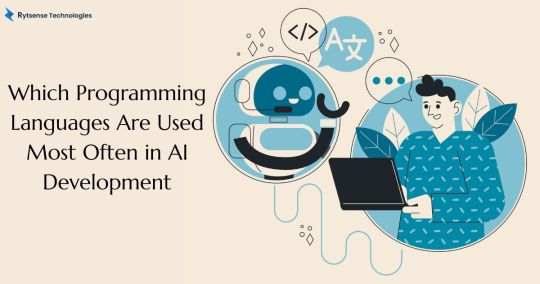
Artificial Intelligence (AI) is revolutionizing industries across the globe, transforming how sectors like healthcare, finance, transportation, and marketing operate. As the demand for AI solutions increases, so does the importance of selecting the right programming language to build these intelligent systems. AI development relies on sophisticated algorithms, neural networks, and machine learning models that require high-performance, scalable, and specialized programming languages.
With a wide variety of options available, choosing the ideal programming language for AI can be overwhelming. This article explores the most widely used programming languages in AI development and discusses why languages like Python, Java, R, and others have become essential tools for AI engineers.
Understanding AI Programming Languages
AI programming languages are designed to manage complex data structures, execute high-performance computations, and build adaptive learning models. These languages often include frameworks and libraries like TensorFlow, PyTorch, and Keras, which simplify tasks such as machine learning, data processing, and deep learning.
Unlike general-purpose programming languages, those used in AI must support symbolic reasoning, data-driven learning, and large-scale numerical computations. As AI technologies advance, the need for high-performing, domain-specific programming languages continues to grow.
Which Programming Languages Are Used Most Often in AI Development?
Below are the most commonly adopted programming languages for AI projects and why developers and organizations gravitate toward them:
1. Python: The Preferred Language for AI
Python is the dominant language in AI and machine learning, widely regarded for its simplicity, readability, and vast ecosystem. It is ideal for beginners and experienced developers alike, offering powerful libraries such as TensorFlow, Keras, PyTorch, Scikit-learn, and NumPy.
According to recent developer surveys, Python is used by more than 90% of AI engineers. Its intuitive syntax allows developers to focus on solving complex problems rather than dealing with language-specific intricacies. The availability of extensive community support and documentation adds to its appeal.
2. R: The Language of Statistical Analysis
R excels in statistical computing and data analysis, making it a favorite among data scientists and statisticians. It is particularly strong in visualizations and predictive modeling—critical components in AI.
Libraries like caret, randomForest, and xgboost simplify machine learning tasks and make R a valuable tool in AI development projects that rely heavily on statistical accuracy. Despite a steeper learning curve compared to Python, R offers unmatched capabilities for complex data manipulation.
3. Java: A Scalable Option for Enterprise AI
Java has long been favored for building enterprise-level applications due to its robustness and scalability. In AI development, Java is used to build large-scale systems, often in finance, healthcare, and telecommunications.
Java supports AI libraries such as Deeplearning4j, MOA, and Weka. Its compatibility with big data platforms like Apache Spark and Hadoop enhances its utility in data-intensive AI environments. While not as beginner-friendly as Python, Java is reliable and widely adopted in enterprise AI applications.
4. C++: High-Speed AI Computing
C++ is known for its execution speed and control over hardware, making it a strong choice for AI applications requiring real-time processing. It is commonly used in domains like robotics, autonomous systems, and high-frequency trading.
Although C++ has a complex syntax, it allows low-level memory management and optimized performance, which is essential for AI models demanding fast computation and low latency.
5. Julia: High-Performance AI Programming
Julia is a newer language gaining momentum in the AI community. It combines the performance of C++ with the ease of Python, making it ideal for tasks such as scientific computing, deep learning, and large-scale data processing.
Julia offers libraries like Flux and MLJ, and its ability to handle complex mathematical operations efficiently makes it suitable for advanced AI tasks. While it has a smaller community, Julia is rapidly growing in popularity.
Specialized Programming Languages in AI
In addition to mainstream languages, several specialized languages have emerged to tackle specific challenges in AI development:
Lisp: One of the earliest AI languages, Lisp is still used for tasks involving symbolic reasoning and recursive functions. It is particularly effective for building expert systems and natural language processing tools.
Prolog: A declarative language well-suited for rule-based logic and knowledge representation. It is commonly used in diagnostic systems and reasoning applications.
Scala: Running on the Java Virtual Machine (JVM), Scala merges object-oriented and functional programming. Its integration with Apache Spark makes it excellent for AI systems handling real-time, big data applications.
Emerging Trends in AI Programming Languages
AI development continues to evolve, and so do the languages used to build these systems. Here are some emerging trends:
Increased Specialization: Languages will continue to evolve to meet the needs of specific AI domains, such as robotics, autonomous vehicles, and NLP.
Quantum Integration: Programming languages will begin to integrate with quantum computing to handle problems beyond the scope of classical computation.
Low-Code/No-Code Platforms: These platforms are expanding AI access, allowing non-programmers to build models with minimal code.
Edge AI Development: Languages that support real-time, on-device AI processing (Edge AI) will grow in importance.
How to Choose the Right Programming Language for Your AI Project
Several key factors influence the choice of language for AI development:
Project Requirements: Real-time applications may benefit from C++, while Python is ideal for prototyping and ML.
Team Skills: Choose a language your team is already proficient in to reduce onboarding time.
Performance Needs: For large-scale deployments, Java or C++ may be better suited.
Ecosystem and Libraries: Consider languages with rich libraries tailored to your use case (e.g., TensorFlow in Python).
Conclusion
When determining which programming languages are used most often in AI development, Python clearly leads the way due to its ease of use and robust ecosystem. However, languages like Java, R, C++, and Julia also offer unique advantages that make them indispensable in specific contexts.
Ultimately, selecting the right language depends on your project scope, development team, and performance goals. As AI continues to expand, developers must remain adaptable and informed about new tools and languages that emerge to support AI innovation.
0 notes
Text
Devant – Top Big Data Analytics Service Providers in India
Devant is recognized as one of the most reliable big data analytics service providers in India, offering cutting-edge solutions that help businesses make smarter, faster, and more informed decisions. We specialize in handling vast volumes of structured and unstructured data, providing services that include data integration, processing, real-time analytics, and visualization. As leading big data analytics service providers in India, we work with tools like Hadoop, Spark, and modern cloud platforms to deliver scalable and secure solutions that meet industry-specific needs. Our team helps organizations across sectors such as retail, healthcare, and finance unlock actionable insights from complex datasets.
As trusted big data analytics solution providers, Devant goes beyond traditional analytics to offer AI-powered insights, predictive modeling, and machine learning integration. Our tailored solutions are designed to streamline operations, forecast trends, and enhance customer experiences. By leveraging our expertise as big data analytics solution providers, clients gain a competitive edge through data-driven decision-making and real-time intelligence. We ensure seamless integration with existing infrastructure and provide ongoing support to keep your analytics ecosystem optimized.
Contact us today and partner with Devant for powerful, future-ready big data solutions.

0 notes
Text
Mastering Java: A Complete Guide to the World's Most Versatile Language
Java is one of the most widely-used programming languages in the world. Known for its stability, scalability, and cross-platform capabilities, Java has stood the test of time for over two decades. Whether you're building mobile apps, enterprise software, or cloud-based applications, Java is a powerful choice for developers across the globe.
In this microblog, we’ll explore what Java is, its core features, real-world applications, and why it remains a critical language in modern software development.
What is Java?
Java is a high-level, object-oriented programming language developed by James Gosling at Sun Microsystems in 1995. The primary philosophy behind Java was "Write Once, Run Anywhere" (WORA), which means that Java code can run on any device that supports the Java Virtual Machine (JVM), without needing to be recompiled.
Since its inception, Java has evolved significantly and is now maintained by Oracle Corporation.
Key Features of Java
Java's popularity stems from a range of robust features that make it suitable for almost any kind of development:
1. Platform Independence
Java programs are compiled into bytecode that runs on the JVM, making them platform-independent.
2. Object-Oriented
Java promotes clean code through principles like encapsulation, inheritance, and polymorphism.
3. Robust and Secure
With features like exception handling, garbage collection, and strong type checking, Java is built to be safe and error-free.
4. Multithreaded
Java supports multithreading, allowing developers to build highly responsive and high-performance applications.
5. Rich API
Java offers a vast collection of APIs for everything from networking and database access to GUI development.
6. Community Support
With millions of developers, endless tutorials, open-source projects, and frameworks, Java has one of the most active developer communities.
The Java Ecosystem
Java is more than just a language—it's an entire ecosystem. Here's a brief overview of the major components:
• Java Development Kit (JDK)
The JDK provides the tools necessary to write and run Java programs, including the compiler and debugger.
• Java Runtime Environment (JRE)
The JRE contains the JVM and libraries needed to run Java applications.
• Java Virtual Machine (JVM)
The JVM interprets the bytecode and allows Java applications to run on any device or operating system.
Popular Java Frameworks and Libraries
To simplify development, Java offers a wide range of frameworks and libraries:
Spring Framework – Ideal for enterprise-level applications
Hibernate – Used for database interaction (ORM)
Apache Struts – MVC framework for web apps
JavaFX – Used for building rich desktop applications
JUnit – For unit testing and test-driven development
Real-World Applications of Java
Java is used across many domains due to its scalability and reliability. Some of the top use cases include:
• Android App Development
Android is primarily built on Java, making it the go-to language for native Android applications.
• Web Applications
Java's servlets, JSP, and frameworks like Spring Boot are widely used to create powerful web apps.
• Enterprise Software
Large corporations use Java for backend systems, payroll, CRM, and supply chain solutions.
• Big Data
Java is used in big data technologies like Apache Hadoop and Apache Kafka.
• Financial Services
Banks and fintech companies use Java to build secure, high-performance systems.
Advantages of Java
• Cross-Platform Capability
One of Java’s biggest strengths is its ability to run anywhere. This means lower costs and broader accessibility.
• Scalability
From startups to multinational corporations, Java handles both small-scale and enterprise-level apps.
• Performance
Thanks to Just-In-Time (JIT) compilation and efficient memory management, Java delivers excellent performance.
• Strong Community
Java has an active and supportive community, which means better learning resources, troubleshooting, and job support.
Learning Java: Where to Start
For beginners, Java is a great language to learn due to its clear syntax and strong documentation. Here's a step-by-step path to learning Java:
Understand Java Basics – Variables, data types, operators, and control statements
Object-Oriented Concepts – Classes, objects, inheritance, polymorphism
Exception Handling and File I/O – Learn to manage runtime errors and file operations
Collections and Generics – Master ArrayList, HashMap, and other collections
Multithreading – Learn to run multiple threads simultaneously
Networking – Build apps that communicate over networks
Build Projects – Create real-world applications to solidify your knowledge
Java vs. Other Languages
Here's how Java stacks up against other popular languages: LanguageStrengthsJava ComparisonPythonEasy syntax, great for data scienceJava is faster, more scalableC++High performance, low-level system accessJava is safer and easier to debugJavaScriptFront-end developmentJava excels on the backendC#Similar to Java, strong Windows integrationJava is more platform-independent
Certifications in Java
If you're aiming for a career in Java development, certifications can give your profile an edge:
Oracle Certified Associate (OCA)
Oracle Certified Professional (OCP)
Spring Professional Certification
These validate your knowledge and help you stand out in job interviews.
Job Roles for Java Developers
Java developers are in high demand in the tech industry. Common roles include:
Java Developer / Software Engineer
Android Developer
Backend Developer
Full Stack Developer
Enterprise Application Developer
According to job portals, Java skills are consistently among the top sought-after in the IT sector.
Future of Java
Despite being over 25 years old, Java continues to evolve. With the release of Java 21, Oracle has added modern features like:
Record classes
Pattern matching
Sealed classes
Enhanced switch expressions
0 notes
Text
How Big Data with Hadoop Can Shape a Successful IT Career

Introduction
In today’s data-driven world, industries across the globe are generating massive volumes of data every second. Whether it’s banking, healthcare, retail, or IT, organizations need powerful tools to process and analyze this data effectively. That’s where Big Data with Hadoop steps in — not only as a solution but also as a gateway to one of the most in-demand careers in tech.
If you’re a student aiming to build a strong foundation in the IT field, learning Big Data with Hadoop could be your first step toward a successful and future-proof career.
Why Big Data with Hadoop Is So Relevant Today
As businesses continue to digitize their operations, the volume of data being produced grows exponentially. Traditional systems fail to handle this scale and complexity. Hadoop, an open-source framework, allows for distributed processing of large data sets across multiple systems. Combined with Big Data technologies, Hadoop helps organizations uncover valuable insights from their data, leading to better decisions and improved outcomes.
Students who enroll in a Big Data with Hadoop course in Yamuna Vihar or Uttam Nagar are equipping themselves with tools and skills that are highly relevant across industries.
Career Scope in Big Data and Hadoop
The job market for professionals skilled in Big Data analysis using Hadoop in Yamuna Vihar and other areas is growing steadily. Career roles like Data Engineer, Hadoop Developer, Big Data Analyst, and ETL Developer are in high demand.
Choosing the Best Hadoop Course for Beginners in Uttam Nagar or Yamuna Vihar allows you to gain the necessary foundation to pursue these roles. With practical knowledge, students can move into roles involving data processing, storage management, machine learning integration, and real-time analytics.
What to Expect in a Quality Hadoop Training Program
A structured training program usually includes:
Core Hadoop Concepts: HDFS, MapReduce, YARN
Hadoop Ecosystem Tools: Hive, Pig, Sqoop, Flume, Spark
Hands-On Projects: Real-time data handling, batch processing
Case Studies: Applications of Hadoop in industries
Placement Support
Many students look for a Hadoop Course with Real-Time Projects in Yamuna Vihar to apply what they’ve learned to real business problems. These hands-on sessions help students grasp how Hadoop works in real-world settings and builds confidence for job roles.
For those new to the field, joining the Best Hadoop Course for Beginners in Uttam Nagar can simplify complex concepts and provide an easy learning curve.
Certification and Placement Opportunities
Earning a Big Data Hadoop Certification in Yamuna Vihar or Uttam Nagar adds credibility to your skills. Certifications are often valued by recruiters and can significantly boost your resume. Institutes that offer Big Data Hadoop Training with Placement in Yamuna Vihar and Uttam Nagar provide the added advantage of guiding students toward real job opportunities.
If you’re serious about a long-term career, consider enrolling in training programs that combine certification with practical experience.
Why Location Matters for Learning
Studying close to home offers the comfort of accessibility and often a more personalized training experience. For students residing in East Delhi or West Delhi, enrolling in Big Data and Hadoop Classes in Yamuna Vihar or Uttam Nagar allows them to study in a focused environment without long commutes.
Some of the Top Hadoop Training Centers in Uttam Nagar are known for their instructor-led learning, real-time project work, and interactive classroom sessions. These local training centers also offer flexible schedules, which is ideal for college students or working professionals.
Final Thoughts: Your Big Data Career Starts Now
Choosing to learn Big Data with Hadoop is more than just acquiring a new skill — it’s stepping into a high-growth industry that offers stability, strong salaries, and countless opportunities for advancement.
Whether you're aiming to become a Data Analyst, Hadoop Developer, or IT Consultant, joining a Big Data Hadoop Institute in Yamuna Vihar or Uttam Nagar can be the starting point of your journey. The combination of strong theoretical knowledge, real-world practice, and certification will help you stand out in today’s competitive job market.
Suggested Links:
Big Data With Hadoop
MIS Reporting
Advanced MS – Excel
Data Science
#data analytics training institute in yamuna vihar#data analytics classes in yamuna vihar#advance excel training instutute in yamuna vihar#data analytics coaching institute in yamuna vihar#advance excel course in yamuna vihar#tally prime training institute in yamuna vihar
0 notes
Text
Why Global Companies Prefer to Hire a Data Scientist from India
In today's data-driven economy, the ability to gather, analyze, and interpret data has become critical to success across industries. As organizations worldwide strive to stay competitive, data science has emerged as a crucial discipline. Increasingly, businesses are choosing to hire a data scientist from India to meet their analytical needs efficiently and affordably. But what makes India such a favorable hub for data science talent?
Let’s explore the reasons behind this growing trend and how companies are benefiting from tapping into India’s data science ecosystem.
The Rise of Data Science in India
A Thriving Tech Talent Pool
India is home to one of the largest and fastest-growing tech workforces in the world. With over 1.5 million engineers graduating annually and a growing number of professionals specializing in fields like AI, machine learning, and data analytics, the country has become a powerhouse for tech-driven talent.
Data science is no exception. Indian universities, online platforms, and corporate training programs are churning out thousands of skilled professionals who are well-versed in statistical modeling, data visualization, Python, R, SQL, and advanced machine learning frameworks.
Cost-Effective Without Compromising Quality
One of the primary reasons global firms choose to hire a data scientist from India is the cost advantage. Indian professionals offer world-class expertise at a fraction of the cost compared to counterparts in the US or Europe. This affordability makes it easier for startups, SMEs, and even large enterprises to build efficient data teams without inflating their budgets.
Key Benefits of Hiring a Data Scientist from India
1. Strong Technical Foundation
Indian data scientists often possess solid backgrounds in mathematics, computer science, and engineering. This enables them to quickly grasp complex problems, develop predictive models, and implement effective data-driven strategies.
2. Proficiency in Modern Tools and Platforms
Professionals in India are proficient with major data science tools and platforms, including:
Programming languages: Python, R, Scala
Data visualization: Tableau, Power BI, matplotlib, Seaborn
Machine learning: TensorFlow, Scikit-learn, XGBoost
Big Data: Hadoop, Spark, AWS, Azure
This technical versatility allows them to integrate seamlessly with international teams and adapt to different project requirements.
3. Fluent Communication Skills
Language is rarely a barrier. Most Indian data professionals are fluent in English, which is the medium of instruction in their academic journey. This makes collaboration across geographies smooth and effective, especially in remote or hybrid work environments.
4. Cultural Adaptability and Global Exposure
Indian professionals often work with clients or teams from the US, UK, Canada, and Australia. Their experience with international projects equips them with the soft skills needed to work across time zones, cultures, and project management systems.
What to Consider When Hiring a Data Scientist from India
1. Assess Skills Beyond the Resume
When looking to hire a data scientist from India, don’t just go by qualifications. Assess problem-solving abilities, real-world project experience, and communication skills through coding tests, case studies, or pilot tasks.
2. Understand the Hiring Model
You can hire freelancers, full-time remote employees, or contract professionals through talent solution providers. Each model comes with its pros and cons depending on your project scope, timeline, and budget.
3. Legal and Compliance Factors
Ensure that NDAs, IP agreements, and data protection policies are in place—especially if the data involves sensitive business information. Partnering with firms that specialize in remote staffing, such as Teamplus Global, can help navigate these compliance aspects smoothly.
How Indian Talent Contributes to Business Growth
Hiring a data scientist is not just about number crunching. These professionals help in:
Predictive Analytics: Forecasting market trends, customer behaviors, and inventory demands
Optimization: Improving operations, logistics, and customer experience through data
Business Intelligence: Building dashboards and reports for real-time decision-making
AI Integration: Developing machine learning models for automation and innovation
By leveraging this expertise, companies can make more informed decisions, enhance productivity, and uncover new growth opportunities.
India’s Data Science Ecosystem Is Evolving
The Indian data science community is supported by thriving tech hubs such as Bengaluru, Hyderabad, Pune, and Gurgaon. These cities are not only home to major IT firms but also host regular data science meetups, hackathons, and innovation labs.
Platforms like Kaggle, GitHub, and Stack Overflow showcase contributions from Indian data scientists to global open-source projects, reflecting their capability and engagement with the broader AI and ML community.
Conclusion: A Strategic Move for Modern Businesses
As data becomes the foundation of competitive strategy, the demand for skilled data scientists continues to grow. Choosing to hire a data scientist from India is no longer just a cost-saving move—it’s a strategic decision backed by quality, innovation, and global collaboration.
Organizations that align themselves with experienced talent partners like Teamplus Global gain a competitive edge by accessing pre-vetted professionals who can deliver impact from day one. With the right approach, hiring from India can become a cornerstone of your data-driven success.
0 notes
Text
The Future of Java: A Promising Scope Ahead
Java has been a cornerstone of the programming world for over two decades. As technology evolves, many wonder about the future of Java and its relevance in an ever-changing landscape. This blog explores why Java continues to hold a strong position and what the future may look like for this beloved programming language.
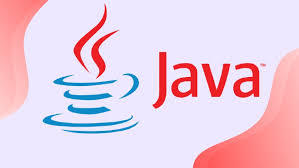
The Enduring Popularity of Java
1. Widespread Adoption
Java is used by millions of developers worldwide and powers a vast array of applications, from web and mobile to enterprise systems. Its versatility makes it a go-to choice for developers across various industries, including finance, healthcare, and education.
2. Strong Job Market
Despite the emergence of new programming languages, Java developers remain in high demand. Job boards consistently show numerous openings for Java-related positions, indicating that companies continue to invest in Java-based technologies.
Key Areas Driving Java's Future
1. Enterprise Applications
Java is the backbone of many enterprise applications. Large organizations rely on Java for its scalability, reliability, and security. As businesses continue to digitalize and automate, Java’s role in enterprise solutions will only grow.
2. Mobile Development
Java is the primary language for Android app development. With the increasing use of mobile devices, the demand for skilled Java developers is expected to rise. The Android ecosystem continues to expand, providing numerous opportunities for innovation and development.
3. Cloud Computing
As more companies migrate to the cloud, Java's capabilities are becoming increasingly relevant. Java frameworks like Spring Boot facilitate the development of cloud-native applications. This shift towards cloud computing means that Java will likely remain a critical player in the development of scalable and efficient cloud solutions.
4. Big Data and AI
Java is also making its mark in big data and artificial intelligence. Tools like Apache Hadoop and Apache Spark, which are built on Java, remain popular for processing large datasets. As businesses harness the power of data analytics and AI, Java’s role in these areas will continue to expand.
Innovations and Updates
Java is not standing still. The language continues to evolve with regular updates and enhancements. The introduction of features like pattern matching, records, and sealed classes in recent versions demonstrates Java's commitment to staying relevant and improving developer experience.
Community and Support
The Java community is robust and active, providing a wealth of resources, forums, and libraries. This support network ensures that developers can find help and share knowledge, further solidifying Java's position in the tech landscape.
Learn Java with DICS Innovatives
If you’re looking to dive into the world of Java, DICS Innovatives offers comprehensive training programs tailored to all skill levels. Java training institute in pitampura With expert instructors and hands-on projects, you’ll gain the knowledge and experience needed to excel in Java development.
Why Choose DICS Innovatives?
Expert Guidance: Learn from industry professionals with real-world experience.
Hands-On Learning: Engage in practical projects that reinforce your skills.
Flexible Learning Options: Choose from online or in-person classes that fit your schedule.
Career Support: Benefit from resources that help you prepare for job opportunities in Java development.
Conclusion
The future of Java looks bright. Its widespread adoption across various sectors, coupled with ongoing innovations, ensures that it will remain a critical programming language for years to come. Whether you're a seasoned developer or just starting, investing time in learning Java through DICS Innovatives could be one of the best decisions you make for your career. Link Source:- https://www.apsense.com/article/857112-the-future-of-java-a-promising-scope-ahead.html
0 notes
Text
BTech in AI & Data Science: Opportunities at Noida’s Leading Engineering Colleges
The world is changing faster than ever, yet it is driven by disruptive technologies such as Artificial Intelligence (AI) and Data Science. Smart systems are becoming increasingly useful in businesses, governments, and industries, enabling smarter decisions, and this is driving the demand for professionals specializing in this area. Should you want to future-proof your career as a student, then a BTech Artificial Intelligence and Data Science is your best bet.

Out of the numerous places in India where one can receive technical education, Noida has become one of the leading places. Noida is well-known as a location close to Delhi, boasting great tech parks and an educational ecosystem, and is home to some of the finest Engineering colleges in Noida, which offer modern, industry-relevant programs. So, it is a good idea to find out why picking this specialization in the best BTech colleges in Noida might get you into a whole slew of interesting possibilities.
What do you understand by BTech in Artificial Intelligence and Data Science?
BTech Artificial Intelligence and Data Science is a 4-year undergraduate course meant to provide a fundamental understanding of machine learning, deep learning, statistics, big data analytics, natural language processing, and algorithm design to the students. The specialization is cropped differently as compared to conventional computer science courses because it is concerned more with intelligent systems, data-driven decision-making, and cognitive computing.
Students are taught how to create intelligent apps that can process independent decisions, identify hidden trends in huge datasets, and construct AI models driving such industries as healthcare, finance, robotics, and cybersecurity, among others.
Why Pick Noida for Your BTech in Data Science and AI?
The selection of the proper city and institution to get an education has a great influence on your career. There are numerous pros of Noida: the city is booming in terms of IT and startups.
1. Existence of Best Engineering Colleges in Noida
In the last ten years, the curriculum of the engineering colleges in Noida has been really updated with the emerging technologies. Such institutions are not only learning institutions but also innovation and research centers. They partner with tech giants and startups to provide students with real-world experience to work on AI and Data Science projects. Most of them are also equipped with incubation centers, allowing the students to develop real-time applications and entrepreneurial concepts.
2. Opportunities of the Industries interface and Internship
The position of Noida in the National Capital Region (NCR) enables it to be a supreme location for networking, internships, and industrial visits. In addition to having practical experience outside of the classroom, students who have completed a BTech Artificial Intelligence and Data Science in Noida are exposed to internship programs in large IT companies, multinational corporations, and analytics start-ups.
3. Cutting-edge Infrastructure
The majority of well-known Noida BTech colleges have high-tech laboratories, AI research rooms, intelligent classrooms, and access to large data and cloud computing networks. This will make the students acquire a hands-on experience of designing and experimenting with intelligent systems with the help of programming languages, tools, and libraries such as Python, TensorFlow, R, Hadoop, and many others.
Curriculum Highlights of BTech in Artificial Intelligence and Data Science
The BTech Artificial Intelligence and Data Science course is designed to build a strong foundation in computer science fundamentals while offering deep specialization in:
Machine Learning & Deep Learning
Data Structures and Algorithms
Natural Language Processing (NLP)
Big Data and Cloud Computing
Predictive Analytics
Data Visualization and Interpretation
AI Ethics and Governance
Besides the theory, the program also focuses on lab work, live projects, industry-oriented certification courses, and capstone projects at the end of the year to find a solution to real-world problems by either using AI or data analytics.
Career Opportunities after BTech in AI and Data Science
The wide range of career opportunities is one of the largest reasons why students should consider taking a BTech Artificial Intelligence and Data Science degree. With almost every industry becoming dependent on smart systems and data analytics, job positions are becoming diversified at a blistering pace.
Among the most demanded profession choices are:
Data Scientist
Machine learning engineer
Artificial intelligence scientist
Data Analyst
Business intelligence developer
Robotics Engineer
Big Data Engineer
Natural Language Processing (NLP)
Furthermore, the students of some of the top recognized engineering colleges in Noida, too, have taken a course of higher education, worked beyond their country of origin, or have been employed in research-based organizations and technological thought-cells.
How can I choose a good Noida BTech college?
When you are sure you want to go for AI and Data Science, then your next task should be to select BTech colleges in Noida that offer you the best one. When you come up with this decision, you should take into account the following factors:
1. Accreditation and Affiliation
Make sure the college is a member of a well-known university and approved by the authorities of this country, such as AICTE, NBA, or NAAC. These will guarantee quality education and a well-organized curriculum.
2. Faculty Industry Connect
Choose colleges that have a more experienced faculty, with many of them preferably including experience in the industry or research in the field of AI and Data Science. It is also good to have tie-ups with industry in guest lectures, workshops, and live projects.
3. Placement Record
Find out all about the institute's placement history. Placement cells of Top Engineering colleges in Noida have many companies that will help students get in touch with the best recruiters in the AI and analytics field.
4. Infrastructure and Education Facilities
World-class infrastructure, such as AI labs, libraries, software licenses, and cloud access, is an enormous factor in the provision of a pragmatic learning experience.
Student Life and Campus Life
Higher education is not only academic, it is also about self-development, your connections, and making discoveries of what you are passionate about. Most of the BTech colleges in Noida provide colorful campus life consisting of tech fests, coding contests, AI hackathons, clubs, classes, and student exchanges.
Located in Noida also implies that you are in a bigger technological suburb. Students have the opportunity to attend meetups, tech talks, seminars, and even international conferences organized frequently in Delhi NCR.
The future is smart, and are you ready?
In the modern data-driven world, the combination of Artificial Intelligence and Data Science is not a trend, it is the future of computing and innovations. AI takes the form of self-driving cars, smart diagnostics, and intelligent chatbots and recommendation engines to diverse and advanced levels.
Our BTech Artificial Intelligence and Data Science is the answer to acquiring a convenient job, commanding great compensation at the end of the working day, not limited to the only high pay, but also a job that comes with intellectual and work-world satisfaction. The globally-intelligent career you will be setting up by pursuing a BTech in Artificial Intelligence and Data Science in one of the top Engineering colleges in Noida is anything but irrelevant.
Final Thoughts
In brief, if you are a 12th-grade student wholly dedicated to technology, problem-solving, and future innovation, the BTech program in Artificial Intelligence and Data Science is your key to success. Additionally, with excellent teaching, cutting-edge technology, and job opportunities at BTech colleges in Noida, you have the perfect foundation for your aspirations.
Therefore, do yourself a favor by browsing through colleges in Noida and prepare to embrace the AI wave that will open up a world of opportunities.
0 notes
Text
Unveiling Java's Multifaceted Utility: A Deep Dive into Its Applications
In software development, Java stands out as a versatile and ubiquitous programming language with many applications across diverse industries. From empowering enterprise-grade solutions to driving innovation in mobile app development and big data analytics, Java's flexibility and robustness have solidified its status as a cornerstone of modern technology.

Let's embark on a journey to explore the multifaceted utility of Java and its impact across various domains.
Powering Enterprise Solutions
Java is the backbone for developing robust and scalable enterprise applications, facilitating critical operations such as CRM, ERP, and HRM systems. Its resilience and platform independence make it a preferred choice for organizations seeking to build mission-critical applications capable of seamlessly handling extensive data and transactions.
Shaping the Web Development Landscape
Java is pivotal in web development, enabling dynamic and interactive web applications. With frameworks like Spring and Hibernate, developers can streamline the development process and build feature-rich, scalable web solutions. Java's compatibility with diverse web servers and databases further enhances its appeal in web development.
Driving Innovation in Mobile App Development
As the foundation for Android app development, Java remains a dominant force in the mobile app ecosystem. Supported by Android Studio, developers leverage Java's capabilities to craft high-performance and user-friendly mobile applications for a global audience, contributing to the ever-evolving landscape of mobile technology.
Enabling Robust Desktop Solutions
Java's cross-platform compatibility and extensive library support make it an ideal choice for developing desktop applications. With frameworks like Java Swing and JavaFX, developers can create intuitive graphical user interfaces (GUIs) for desktop software, ranging from simple utilities to complex enterprise-grade solutions.
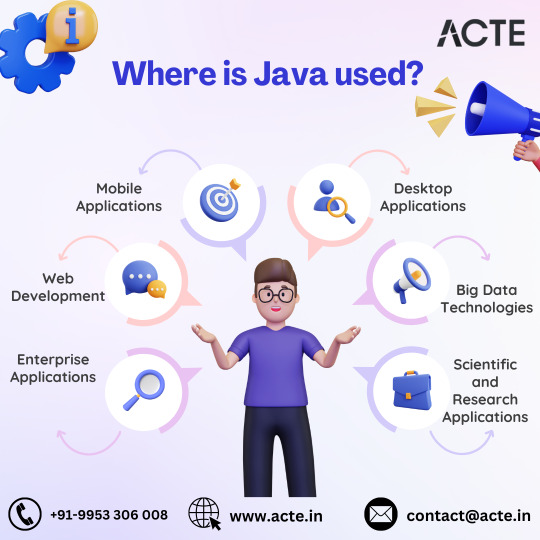
Revolutionizing Big Data Analytics
In big data analytics, Java is a cornerstone for various frameworks and tools to process and analyze massive datasets. Platforms like Apache Hadoop, Apache Spark, and Apache Flink leverage Java's capabilities to unlock valuable insights from vast amounts of data, empowering organizations to make data-driven decisions.
Fostering Innovation in Scientific Research
Java's versatility extends to scientific computing and research, where it is utilized to develop simulations, modeling tools, and data analysis software. Its performance and extensive library support make it an invaluable asset in bioinformatics, physics, and engineering, driving innovation and advancements in scientific research.
Empowering Embedded Systems
With its lightweight runtime environment, Java Virtual Machine (JVM), Java finds applications in embedded systems development. From IoT devices to industrial automation systems, Java's flexibility and reliability make it a preferred choice for building embedded solutions that require seamless performance across diverse hardware platforms.
In summary, Java's multifaceted utility and robustness make it an indispensable tool in the arsenal of modern software developers. Whether powering enterprise solutions, driving innovation in mobile app development, or revolutionizing big data analytics, Java continues to shape the technological landscape and drive advancements across various industries. As a versatile and enduring programming language, Java remains at the forefront of innovation, paving the way for a future powered by cutting-edge software solutions.
2 notes
·
View notes
Text
Unlock the Power of Data with Our Big Data Fundamentals Course in the UAE
In today’s digital-first world, data is the new oil — and those who know how to manage and analyze it hold the key to innovation, business intelligence, and career advancement. The Big Data Fundamentals course at Go Learning is expertly designed to introduce learners to the core principles of Big Data, preparing them for success in one of the fastest-growing fields in tech.
Why Big Data Matters
Big Data is more than just a buzzword — it’s a driving force behind strategic decisions, consumer insights, and technological advancement. From healthcare and retail to finance and artificial intelligence, industries across the globe rely on Big Data to optimize operations and predict future trends. Understanding the fundamentals of Big Data gives you the ability to contribute meaningfully to data-driven environments.
What You’ll Learn in Our Big Data Fundamentals course
Our Big Data Fundamentals course provides a comprehensive introduction to the key concepts, tools, and techniques that define Big Data systems and architectures. By the end of the program, learners will have a strong grasp of:
Big Data concepts and evolution Understand how Big Data differs from traditional data and the 5Vs — Volume, Velocity, Variety, Veracity, and Value.
Big Data architecture Explore the components of modern Big Data systems including storage, processing, and analysis frameworks.
Technologies like Hadoop and Spark Learn how open-source technologies enable distributed computing and real-time data processing.
Data processing pipelines Get hands-on experience in creating end-to-end data workflows and understand ETL (Extract, Transform, Load) processes.
Use cases across industries Examine real-world Big Data applications in marketing, healthcare, finance, and logistics.
Who Should Take This Course?
Whether you’re a beginner exploring a new career path or a professional looking to upskill, our Big Data Fundamentals course is ideal for:
IT professionals transitioning into data science roles
Business analysts looking to understand data infrastructure
Students and graduates aiming to build a career in data and AI
Entrepreneurs who want to use data for strategic decisions
Course Features at Go Learning
At Go Learning, we prioritize a learner-focused approach. Our Big Data Fundamentals course offers:
Interactive Learning Modules — Clear, easy-to-understand lessons developed by industry experts Flexible Learning — Study online at your own pace Practical Exercises — Work on real datasets to apply your learning Certification — Earn a recognized certificate to boost your resume Career Guidance — Access mentorship and job support in the data science ecosystem
Why Choose Go Learning?
Go Learning is a leading educational platform in the UAE, trusted by thousands of learners for upskilling in the tech and business domains. With certified instructors, practical content, and a focus on employability, we help students move from learning to earning.
Career Prospects After the Big Data Fundamentals course
Big Data is at the heart of modern decision-making, and skilled professionals are in high demand. After completing this course, you can explore roles like:
Junior Data Analyst
Big Data Developer
Business Intelligence Associate
Data Engineer (Entry-level)
AI/ML Support Roles
The foundational knowledge from this course also paves the way for advanced study in data science, artificial intelligence, and cloud computing.
Enroll Today and Start Your Big Data Journey
Don’t miss out on the opportunity to future-proof your career. Whether you’re planning a move into data science or enhancing your current tech skills, the Big Data Fundamentals course at Go Learning is the perfect starting point.
FAQs
Q1: Do I need prior experience in coding to join this course? No. This course is designed for beginners. Basic familiarity with computers is helpful but not mandatory.
Q2: Is the course available online? Yes. You can access all modules online and learn at your convenience.
Q3: Will I receive a certificate? Yes. You will receive a certificate upon successful completion of the course.
Q4: Can this course help me get a job? Absolutely. While this is a fundamentals course, it builds the right base for data-related roles and further specialization.
Q5: Is there any support available after the course? Yes. Go Learning offers mentorship and career guidance even after you complete the course.
0 notes
Text
☕ What Is Java?
Java is a high-level, object-oriented programming language used to build web apps, mobile apps (especially Android), enterprise software, and more. It's known for being platform-independent, secure, and robust.
💡 Java’s motto: “Write Once, Run Anywhere” – thanks to the Java Virtual Machine (JVM).
🚀 Why Learn Java?
FeatureBenefitPlatform-independentRuns on any OS (Windows, Mac, Linux) via JVMObject-OrientedEncourages clean, modular code with classes and objectsStrongly typedLess prone to runtime errorsMassive ecosystemFrameworks, libraries, and tools for all kinds of appsJob opportunitiesWidely used in large enterprises, banks, Android apps
📦 What Can You Build with Java?
Application TypeExampleWeb applicationsBanking apps, CMSs (e.g., Spring Boot)Mobile apps (Android)WhatsApp, Instagram, PaytmDesktop appsIDEs like IntelliJ, EclipseEnterprise softwareERP, billing systemsGame developmentMinecraft was originally built in JavaBig data + backendUsed in tools like Hadoop
🧱 Core Concepts in Java
ConceptDescriptionVariables & Data Typesint, String, double, boolean, etc.Operators+, -, *, /, ==, !=, &&, `Control Flowif, else, switch, for, while, do-whileMethodsFunctions in Java to organize codeObject-Oriented ConceptsClass, Object, Inheritance, Polymorphism, EncapsulationArrays & CollectionsStore data: ArrayList, HashMap, SetException HandlingTry-catch blocks to handle errors gracefullyFile I/ORead/write files using streams
🔧 Java Tools & Ecosystem
Tool/TechUseJDK (Java Development Kit)Core toolset for compiling and running JavaEclipse / IntelliJ IDEA / NetBeansIDEs (code editors for Java)Maven / GradleBuild automation and dependency managementSpring FrameworkPowerful backend framework for web appsJUnitUnit testing frameworkAndroid StudioBuild Android apps with Java or Kotlin
🧭 Learning Roadmap for Java (Beginner to Advanced)
✅ Step 1: Java Basics
Data types, variables, operators
Control structures: if-else, loops
Methods and basic input/output
✅ Step 2: Object-Oriented Programming (OOP)
Classes and objects
Inheritance, polymorphism, encapsulation
Interfaces and abstract classes
✅ Step 3: Intermediate Java
Exception handling
File handling
Collections framework (List, Set, Map)
Java 8+ features: Streams, Lambda expressions
✅ Step 4: Advanced Java
Multithreading and concurrency
JDBC (Java Database Connectivity)
Generics
Annotations
✅ Step 5: Java in Practice
Build mini-projects (e.g., calculator, student database, online quiz)
Explore Spring Boot for backend APIs
Use JavaFX for desktop apps or Android Studio for mobile
🧪 Example Mini Projects
Banking System Console App
Tic Tac Toe or Snake Game
Library Management System
Student Record System with File I/O
REST API using Spring Boot
0 notes